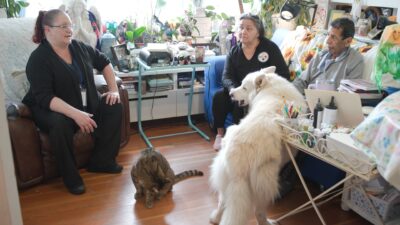Your presence matters
Creating an atmosphere of presence is an important first step when a loved one or friend is grieving.
Acknowledge the significance of their loss by visiting, checking in with phone calls and texts, sending an email or card, or making a memorial donation to a charitable cause. These signs of support can make the journey steadier and more tolerable for those who are bereaved.
And remember that there is no “finish line” for grief. It is a process of moving forward with a changed future, and each grieving person’s experience is unique.
What you can do
Everyone reacts differently in the days immediately after a death. Your friend or loved one might appear stoic and show little emotion about their loss. They may be devastated by the loss and unable to respond to people who offer help. Or they might be overwhelmed, grateful, or buoyed by an outpouring of support.
In these early days, and in the weeks and months ahead, you can:
- Listen to stories about the person who died, if your friend or loved one wants to share them. If you knew the person, share your fond memories, too.
- Expect frequent changes in moods and reactions during the grieving process, which can last days, weeks, or months.
- Offer practical and specific help: make meals, give rides, run errands. Ask if you can help to write or place an obituary, or assist with some aspect of the funeral or memorial service.
- Recognize that some grievers express themselves with words, tears, or both, while others do something more active, such as starting a memorial project. Most people blend those approaches as they adjust to their loss.
- Suggest activities that you have enjoyed together in the past: “Want to take a walk?” or “Let’s go to lunch tomorrow, or I can bring lunch if you prefer.”
- Check in often with specific questions: “Can I arrange grocery deliveries for the next month?” or “Do you want me to ask your minister/priest/rabbi to stop by?”
- Be aware of key moments, such as a birthday, anniversary, or holiday, that can be particularly hard for those grieving a loss.
- Watch for signs that your friend or loved one, months after the loss, continues to struggle a great deal with their grief. If their behavior is self-destructive or harmful to others, or if their daily routines continue to be severely affected, it may be a sign that a therapist, grief counselor, or grief support group would be helpful.
- Learn more about bereavement by reading more about grief on this site or in your local library.
What not to do
Everyone reacts differently to a loss, and each loss is different depending on the relationship and circumstances. There is no “correct” way to grieve and no timeline for moving through the process.
Do not:
- Compare your loss experience or that of others to what your bereaved friend or loved one is experiencing. You do not — and cannot — “know exactly how you feel.”
- Ask questions that are too open-ended. Try “What do you have planned for today?” rather than “How are you feeling?” Specific offers are more helpful than “Let me know if you need anything.” Try “What can I pick up for you at the grocery store?” instead.
- Suggest that the death they are grieving was “for the best.”
- Attempt to correct or redirect their grief reactions unless they are harming themselves or others. There is no “right” way to grieve, unless it will cause harm.
- Insist they participate in activities they would rather avoid for now.
- Be afraid to laugh with them or imply that their laughter is inappropriate. Humor can be helpful and restorative in grief.
- Suggest they are in a particular “stage” of grief. Grief does not have stages; it is an ongoing process.
- Give unsolicited advice about sorting through or disposing of the deceased person’s belongings, or suggest the “right” time to do so.
Most importantly, do not abandon the grieving person shortly after their loss. Continue to be present and supportive by checking in regularly and offering help during the weeks and months that follow.


